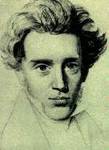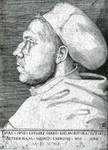
[Soren Kierkegaard was a Danish Lutheran and one of Denmark's most revered philosophers, and began his theological career quite sympathetic to Luther . But that opinion underwent a significant change. By the end of his life, as Walter Lowrie wrote, Kierkegaard had "nothing but denunciations" for Luther. The following quotations track this change in Kierkegaard's thinking, and are adopted from Alice von Hildebrand, "Kierkegaard: A Critic of Luther," Latin Mass magazine (Spring, 2004), pp. 10-14).
-- [S. Kierkegaard] --
"There is a curious connection between Protestantism and the modern political point of view: it is a struggle for the same thing, the sovereignty of the people."
"When one reads Luther one gets the impression rightly enough of a sure and certain
mind, of one who speaks with a decision that is 'authoritative.' And yet, it seems to me there is something disturbing about his certainty, which is in fact uncertainty. It is common knowledge that a particular state of mind often tries to conceal itself beneath its opposite. One encourages oneself with strong words, and the words become even stronger because one is hesitant. That is not deception, but a pious wish. One does not wish to express the uncertainty of fear, one does not wish or dare even to name it, and one forces out the very opposite mood in the hope that it will help. Thus Luther makes paramount use of that wish is used with such moderation in the New Testament: the sin against the Holy Ghost." -- [Martin Luther] --
As for the rest, the closer I examine Luther the more convinced do I become that he was muddle headed. It is a comfortable kind of reforming which consists in throwing away burdens and making life easier.... True reforming always means to make life more difficult, to lay on burdens; and the true reformer is therefore always put to death as though he were the enemy of mankind. Luther's 'hear me, thou Pope' ... sound[s] to me always disgustingly worldly. Is that the sacred earnestness of a reformer ... who knows that true reformation consists in becoming more inward? Such an expression is just like a journalist's slogan. That unholy political attitude, that desire to overthrow the pope is what is so confusing about Luther."
"Luther, your responsibility is great indeed, for the closer I look the more clearly do I see that you overthrew the pope and set the public on the throne.... You altered the New Testament concept of 'the martyr,' and taught men to win by numbers."
"[Luther's] later life accredited mediocrity. It should be noted that in a certain sense it takes a hero to accredit mediocrity and in Protestantism we are blessed with this beyond measure."
"[Luther] really became a politician, to whom victory is more important than 'how' one is victorious."
"The Middle Ages fell into error and believed that is was a sacred shame for a priest to marry. Then came Luther ... and got married. Now it is regarded as a shame when a priest does not marry. One cannot well be a parson when one is not married. The congregation will not have entire confidence in him when he is not married. Verily the world has gone ahead spiritually. In the Middle Ages they had most confidence in an unmarried man, they conceived that they had a guarantee in his unmarried state. This is the syllogism of the spirit. Now they have most confidence in the married man: they conceive that in the fact that he is married they have a guarantee that he will not seduce one's wife and daughter.... [T]his is the syllogism of the flesh."
"Luther really could not have been wht we call 'in love' with Catherine von Bora. I can imagine him saying to her: 'My dear girl, the purpose of my marriage -- as I told you -- is to defy Satan, the Pope, and the whole world. This being the case, you can understand that I could just as well marry your kitchen maid."
"[I]t can come to the point in Protestantism when worldliness is honored and venerated as godliness. And that, I maintain, cannot happen in Catholicism.... No wonder Luther very quickly got such great support. The secular mentality understood immediately the break.... [T]hey grinned in their beards ... at Luther ... that chosen instrument of God who had helped men so splendidly make a fool of God."
"When Catholicism degenerates, what form of corruption will show itself? The answer is easy: mock holiness. When Protestantism degenerates, what form of corruption will show itself? The answer is not difficult: shallow worldliness. But in Protestantism this will show itself with a refinement which cannot occur in Catholicism."
"Most people really believe that the Christian commandment (e.g. to love one's neighbor as oneself) is intentionally a little too severe, like advancing the clock a half an hour to make sure of not being late in the morning."
"The longer I study Luther, the more clear does it become that Luther also ... confuses what it means to be the patient with what it means to be the doctor; he had the patient's passion for expressing and describing his suffering, and what he feels would be its alleviation. But he had not the doctor's breadth of view. And in order to reform Christianity the first requirement is surely to have a view of the whole of Christianity."
"Luther is the very opposite of the apostle [St. Paul]. The apostle expresses Christianity in God's interest.... Luther expresses Christianity in man's interest."
"The congregation was afraid of going to confession; the confessional box made it all too real. The priests were afraid of hearing confession; it became much too serious a matter."
"The end of Luther's sermon on 1 Corinthians 13, where he concludes that faith is greater than love, is sophistry. Luther always wants to explain love as love of one's neighbor, as though it were not also a duty to love God.... Luther put faith in the place of love of God, and then called love, love of one's neighbor."
______________________________________________________________
Note:
1. See Luther's Works, Vol. 35: Word and Sacrament, I, ed. E. Theodore Bachmann (Philadelphia: Muhlenberg Press, 1960), p. 394, n. 43.


1 comments:
Anonymous
said...
thank you very much
Post a Comment